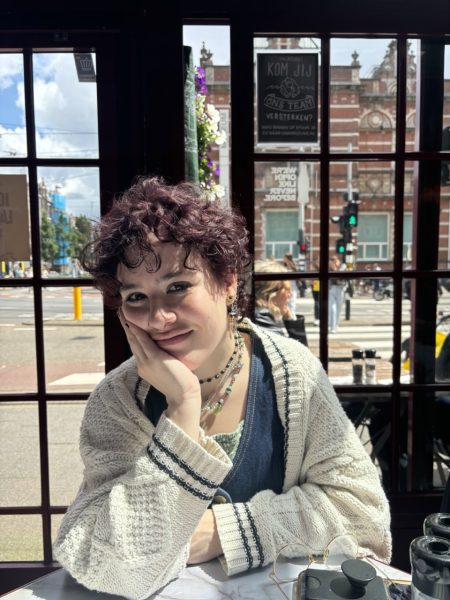From speaking about the importance of Fandango and son jarocho music in Veracruz, Mexico to playing it on her jarana jarocha as everyone clapped along, Sophia Enríquez filled the hall with Latino culture. Her talk, “Fandango Futurities: Listening for the Nuevo South and an Emerging Southern Son,” took place in Schaffel Recital Hall in Broyhill Music Center on Feb. 22.
Enríquez is the Andrew W. Mellon Assistant Professor of Music, Latinx Studies, and Gender, Sexuality, and Feminist Studies at Duke University, primarily working in the intersections of Latino and Appalachian regional culture.
As a part of the Music Humanities Community Conversation Series hosted by the Hayes School of Music and the Center for Appalachian Studies, the webpage states that it aims to engage community members in “current topics in music humanities.”
Jacob Kopcienski, an assistant professor of musicology at App State and coordinator of the event, talked about the importance of the series.
“Having the speaker series here feels really important because we can learn about ideas not by reading or consuming media, but all gathering in the same space, hearing the same person talk, and being able to have a conversation immediately after the event, it can impact us as we continue to go forward either as students or as faculty members,” Kopcienski said.
Kopcienski began the event by thanking everyone who made the event possible and introducing Enríquez. She started her presentation with her background of growing up in Southern Ohio, and why she got interested in and became more involved in Appalachian Studies.
“I grew uneasy with how my own experiences as a part of a Mexican American family blended with Appalachian heritage were not part of the stories that I was encountering,” Enríquez said.
From there, she started with the first part, “Fandango in the South,” of a three part presentation, saying, “it starts in one south and ends in another.”
She referenced the roots of Fandango, specifically the type coming from Veracruz, Mexico that partners with son jarocho music, a genre that originated in Afro Mexican communities in the 1800s. She said this music is commonly accompanied by “a percussive form of dancing” on a raised wooden platform.
She showed videos of this taking place in Veracruz, followed by performing a verse from “Buscapiés” on her jarana jarocha. Loosely translating to “firecracker,” she talked about its connection to nature, where these explosive performances were often held at night by Afro Mexican and mestizo communities to bypass the oppressive rules of the colonial government.
What draws many people to the genre according to Enríquez is its accessibility, as it is easy to teach to children.
“The Fandango might be deceptively underwhelming, and yet its ability to capture one’s attention, that’s where its complexity lies, an ever shifting rhythmic center and the uncertainty of the improvisation and overall it’s adaptability to place,” Enríquez said.
Transitioning to the present day, she talked about the “Fandango de Durham,” a live event featuring Mexican and Mexican American performers that brought Fandango to the South. The event helped fund Indigenous weavers in Southern Veracruz along with promoting local Latino artists and food trucks in the Raleigh-Durham area.
She moved on to the second part of the presentation, “A Not So Nuevo South: Forgotten Roots,” where she spoke about the migration of Latino families in the early twentieth century after the Mexican-American War. She mentioned her own family history when her grandparents moved to the U.S. as sharecroppers. Though they experienced a racialized existence in the Nuevo South, they still maintained a strong Mexican identity.
“At the core, the Nuevo South is fraught with the complexity and impossibility of its racialized context in history from which its music is not separate,” Enríquez said.
She detailed the history of the Carter Family, renowned folk singers who grew famous in Appalachia. They had great influence on singers like Lydia Mendoza, a skilled mandolin player who fused styles, when they moved near the U.S.-Mexico border. Enríquez played “Panchita” by Lydia Mendoza in order to hear her style that became known as Tejano music.
With this history, she noted how white people have dominated Appalachian music.
“I unpack ‘mountain music’ as this caricature of Appalachian music and the widespread notion that always is codified in music and racialized as white,” Enríquez said.
She cited the example of the banjo as an instrument rooting from Black musicians in Appalachia and in the Caribbean that white Appalachians took claim of.
In the final part, “Fandango Futurities at the Mountain Fiesta,” she talked about the Mountain Fiesta Festival which takes place in Cumberland Gap, Tennessee. Like the Fandango de Durham, it embraces local performers and celebrates the intersections of Appalachia and the Mexican American Community.
To demonstrate the connections between the two, she played a Mexilachian rendition of “Buscapiés” with the verses by Brenci Patiño.
“I think that this poetic interpretation of Mexilachia through son jarocho really brings into focus not only son jarocho’s poetic investment in place, but the way it is malleable to a new place, especially when that place carries so many cultural residences,” Enríquez said.
She ended the conversation by talking about the way in which Latino people gather and the futurity of the music genre.
“The futurity of the Fandango in the South is that of a community practice that allows us to tell more complete stories, build better relationships and help us understand our current and future perplexities more fully, challenging our ideas about who makes home in the South and what that sounds like,” Enríquez said.
The next installment of the Music Humanities Community Conversation Series titled “Archives and Community: Remembering Queer Cultural Organizing in Appalachia” takes place March 28 from 7:00-8:00 p.m. in the Schaffel Recital Hall featuring Kopcienski.


